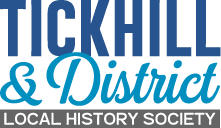

Tickhill and the 1741 Parliamentary Election
By today's standards it seems extraordinary that in the 18th Century only two parliamentary elections saw seats contested in the Yorkshire County Constituency, the considerable expense involved in standing for election and the possibility of public disorder at the hustings encouraging the knights of the shire to decide among themselves who should stand for election unopposed. A General Election was held in 1734 when four candidates contested the two available Yorkshire Constituency seats, while the second election in 1741 was a by-election following the death of sitting MP Viscount Morpeth. Cholmley Turner (Whig) and George Fox (Tory) contested the seat, the poll beginning on 13 January 1741 and lasting eight days. Turner prevailed with 8,005 votes to Fox's 7,049. (This was a lower turnout than in 1734 when just over 23,000 voted in the same constituency.) All intending to vote had to travel to the hustings held at York Castle and make a public declaration of their votes which were recorded by clerks in a poll book, poll books having been introduced in 1696. The poll books were later held in Chancery but destroyed in 1907, however some local versions survived, such as the pamphlet collating the 1741 poll results in Yorkshire, published in 1742.
There were approximately 380 families living in Tickhill at the beginning of the 1740s, but only male owners of freehold property were enfranchised, each parish in Yorkshire deciding the precise criteria for who should vote. Sixty-one Tickhill men had their votes recorded in York in 1741, with 51 of them voting for George Fox. The pro-Fox men were predominantly farmers, such as Joseph Barlow, John Booker, John Damm, Timothy Hawksworth, Thomas Hickson, John Nelson and Joshua Stocks, and tradesmen such as Richard Amery (butcher), William Beckett (dishturner), John Howson (mason), Matthew Jackson (chandler), William Linley (parish clerk and shoemaker), William Lockwood (papermaker), Henry Shaw (tanner) and Richard Wright (tailor). A few Tickhill men who voted for Fox were classed as gentlemen such as John Laughton and Thomas Moore. Ten men from Tickhill voted for Cholmley Turner including the recently appointed vicar, the Revd John Elam (in post 1740-1774) clearly of a different political persuasion to the parish clerk, but reflecting the Whig preference of Church of England clergy generally. The other Turner supporters included farmers, George Booker (elder brother of the Tory voting John Booker), Thomas Hacket and John Dickenson, and tradesmen Robert Rogers (miller) and John Wright (tanner). (Information about the voters' occupations comes from finding their details in the Parish Registers.) The Turner supporters could be said to have been in favour of the political status quo, supporting the party of Sir Robert Walpole.
It is interesting to compare the voting pattern of Tickhill's men with the results in nearby communities. The Whig Turner was favoured by the majority from Bawtry (10 votes compared to 5 for Fox), the majority from Maltby (12 votes for Turner, 9 for Fox) and especially by Rotherham's voters (57 votes for Turner, 6 for Fox). In contrast, the majority of voters from Doncaster supported Fox (66 compared to 46 for Turner) as did the majority from Wadworth (21 votes for Fox, 2 for Turner).
The persuasiveness of Fox and his agents could have played a part in convincing so many of Tickhill's, Wadworth's and Doncaster's voters to support Fox, the Tory candidate, as could a dissatisfaction with the Whigs, the main party of government since the accession of George I. The Whigs led by Walpole, First Lord of the Treasury and Chancellor of the Exchequer 1715-1717 and again from 1721, were returned with a comparatively slim majority of between 16 and 18 at the 1741 General Election called in May 1741. (The two Yorkshire MPs Turner (Whig) and Sir Miles Stapylton (Tory) were returned without another poll taking place.) Reasons for the Whigs' declining popularity included resentment with Walpole's support for taxing salt, in 1732, and attempting to change the tax arrangements for tobacco and other imported goods. A verse of a song written in Doncaster for the 1734 election showed the anti-Whig feeling in this area caused by taxation:
You all know the danger to which we're exposed
It will soon overwhelm us if not soon opposed
That Gigantic Monster by some called Excise
Stares dreadfully at us with 10,000 eyes
Walpole's further time in office was short lived as he resigned in February 1742 after he lost the confidence of the House of Commons. He then took his seat in the House of Lords as the Earl of Orford. Fox, defeated in the 1741 by-election, was subsequently elected as MP for the City of York and later served as Lord Mayor of York in 1757. York was one of several boroughs in the county able to elect their own MPs, along with, for example, Beverley, Hull and Pontefract.